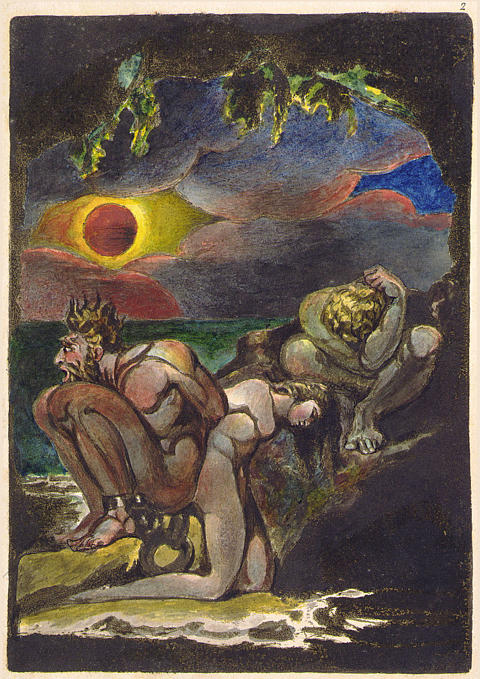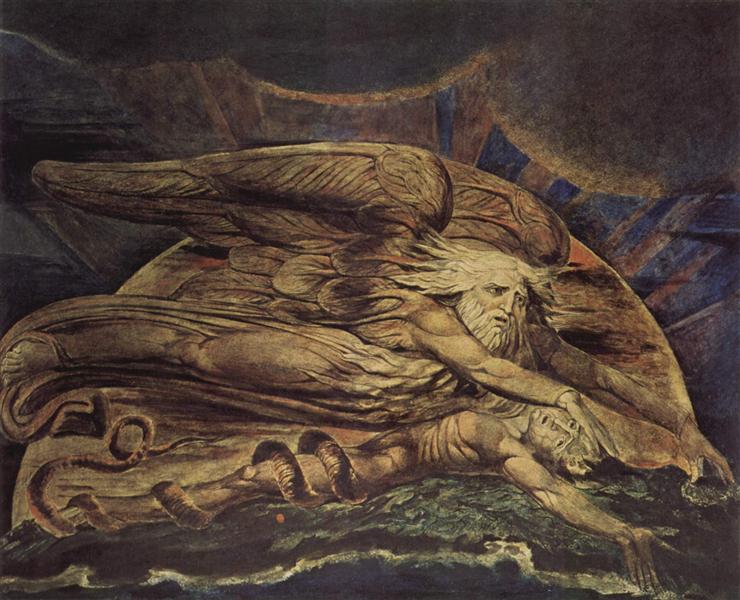Jerusalem, Plate 75 (color image from Blake Archive)
 The consequences of practicing a religion of Moral Virtue are personified in Rahab. The codification of the law elevates the law above the individuals it is meant to serve. The law, elevated to the ultimate status becomes an idol which replaces God. The law which was meant to bring man to God, instead emphasizes obedience which is an external operation. Inspiration which takes place internally from the spirit is the contrary of law. Blake came to believe that the Old Testament revelation was a necessary step in the evolution of spiritual consciousness. However it brought about a State of Error which must be transcended by the incarnation through which man has direct internal connection with spiritual reality.
The consequences of practicing a religion of Moral Virtue are personified in Rahab. The codification of the law elevates the law above the individuals it is meant to serve. The law, elevated to the ultimate status becomes an idol which replaces God. The law which was meant to bring man to God, instead emphasizes obedience which is an external operation. Inspiration which takes place internally from the spirit is the contrary of law. Blake came to believe that the Old Testament revelation was a necessary step in the evolution of spiritual consciousness. However it brought about a State of Error which must be transcended by the incarnation through which man has direct internal connection with spiritual reality.In A Blake Dictionary, Damon gives us details about the character Rahab:
[she] "symbolizes the false church of this world, the opponent of Jerusalem, and the crucifier of Jesus (FZ viii:406)"..."Rahab is Natural Religion. She is 'Vala drawn down into a Vegetated Body' (FZ,viii:280) "... "She is the system of Moral Virtue (J 39:10). She imputes Sin and Righteousness to individuals (J70:18), although Los tells her to distinguish between States and the Individual in them (FZviii:379)."..."Rahab, as Natural Religion, is the seductive harlot."..."Rahab as the Female Will seeks dominion by means of sex".
In Damon's description Rahab may not seem very appealing but her power lies in her seductive beauty. Both the orderliness of the law and the intricacies of nature offer the same seductive appeal. Blake associates Rahab's attractiveness with the threefold character by which Blake meant the materialized body - Head, Heart, and Loins. The fourth element of man was absent - Urthona, the unifying principle, the intuition or imagination. The Chariot without its driver was less than human which is Fourfold not threefold.
Jerusalem, Plate 70, (E 224)
"Imputing Sin & Righteousness to Individuals; Rahab
Sat deep within him hid: his Feminine Power unreveal'd
Brooding Abstract Philosophy. to destroy Imagination, the Divine-
-Humanity A Three-fold Wonder: feminine: most beautiful: Three-fold
Each within other. On her white marble & even Neck, her Heart
Inorb'd and bonified: with locks of shadowing modesty, shining
Over her beautiful Female features, soft flourishing in beauty
Beams mild, all love and all perfection, that when the lips
Recieve a kiss from Gods or Men, a threefold kiss returns
>From the pressd loveliness: so her whole immortal form three-fold
Three-fold embrace returns: consuming lives of Gods & Men
In fires of beauty melting them as gold & silver in the furnace
Her Brain enlabyrinths the whole heaven of her bosom & loins
To put in act what her Heart wills; O who can withstand her power
Her name is Vala in Eternity: in Time her name is Rahab
The Starry Heavens all were fled from the mighty limbs of Albion
PLATE 71
And above Albions Land was seen the Heavenly Canaan
As the Substance is to the Shadow: and above Albions Twelve Sons
Were seen Jerusalems Sons: and all the Twelve Tribes spreading
Over Albion. As the Soul is to the Body, so Jerusalems Sons,
Are to the Sons of Albion: and Jerusalem is Albions Emanation
What is Above is Within, for every-thing in Eternity is translucent:
The Circumference is Within: Without, is formed the Selfish Center
And the Circumference still expands going forward to Eternity.
And the Center has Eternal States! these States we now explore."
Jerusalem, Plate 98, (E 257)
"A Sun of blood red wrath surrounding heaven on all sides around
Glorious incompreh[en]sible by Mortal Man & each Chariot was Sexual Threefold
And every Man stood Fourfold, each Four Faces had. One to the West
One toward the East One to the South One to the North. the Horses Fourfold
And the dim Chaos brightend beneath, above, around! Eyed as the Peacock
According to the Human Nerves of Sensation, the Four Rivers of the Water of Life"
Four Zoas, Page 85, (E 368)
"If we unite in one[,] another better world will be
Opend within your heart & loins & wondrous brain
Threefold as it was in Eternity & this the fourth Universe
Will be Renewd by the three & consummated in Mental fires
But if thou dost refuse Another body will be prepared"








